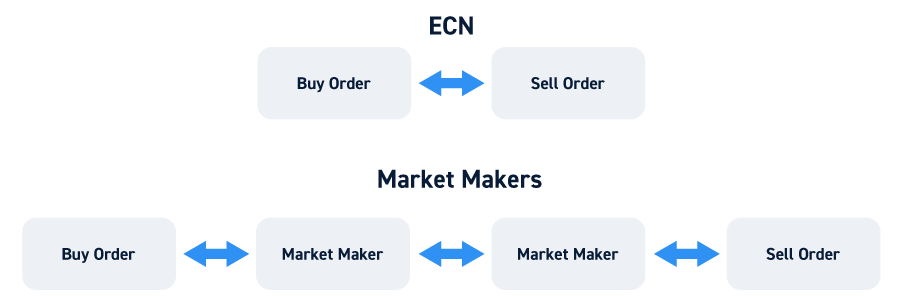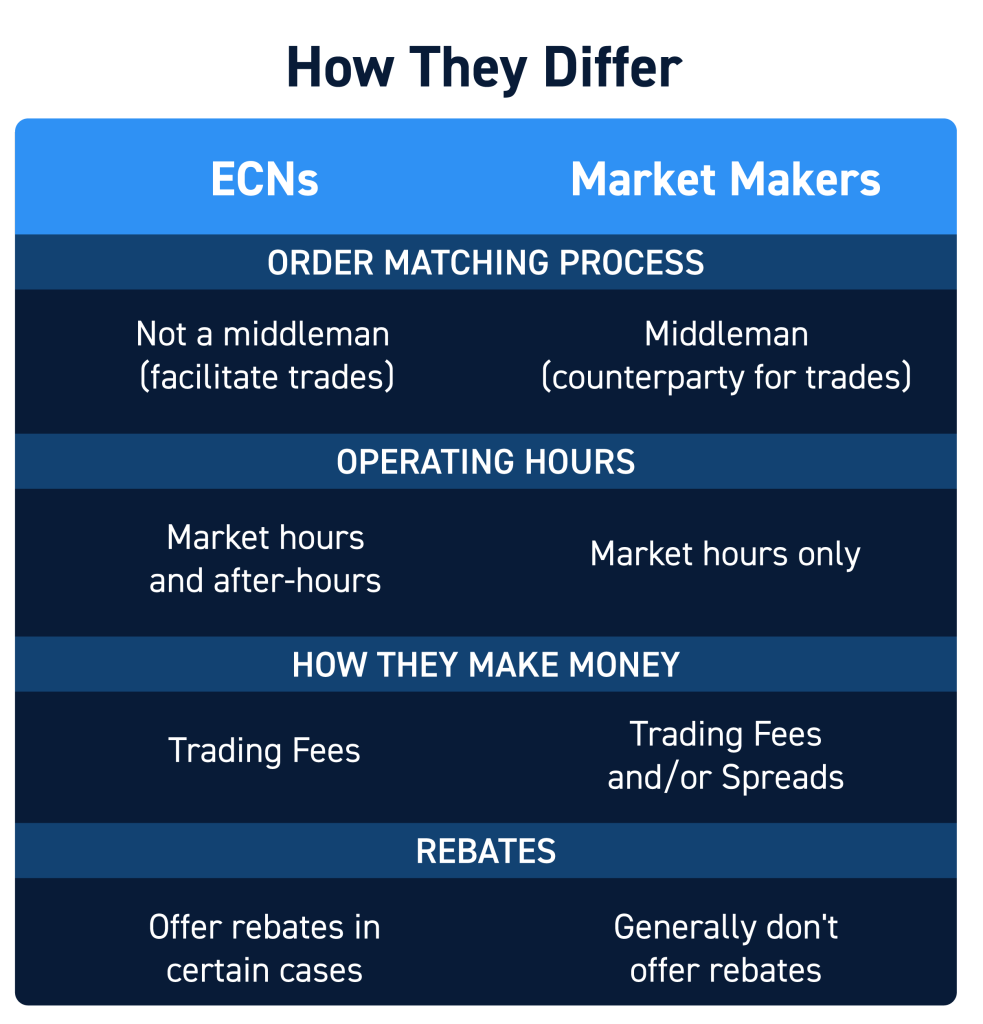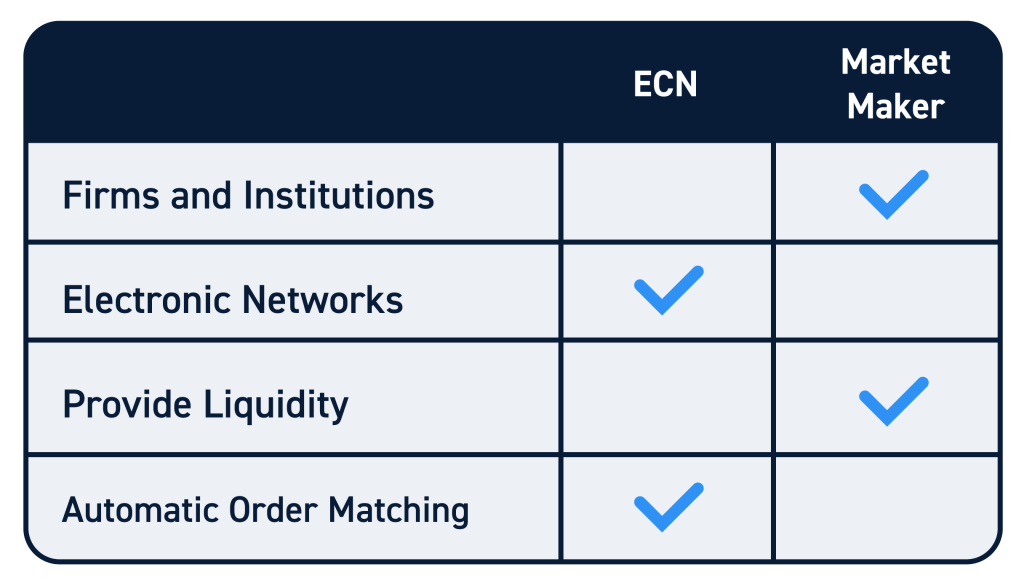Introduction
When you place an order to trade stocks, there are typically two ways in which it can be processed: by a market maker or by an electronic communications network (ECN). Market makers and ECNs are critical for keeping the market running smoothly and play important roles in setting bid and ask prices for stocks.
In this guide, we’ll explain what market makers and ECNs are and how they differ.
What is a Market Maker?
A market maker is usually a bank or brokerage firm that acts as a middleman on a stock exchange. A market maker sets the bid and ask prices for a stock. They create a market for that stock by buying at the bid and selling at the ask as orders come in.
That means that when you sell a stock, you’re actually selling it directly to a market maker rather than to another trader who is looking to buy that stock. The market maker takes the opposite side of your trade and actually takes ownership of the shares you sell, even if only for a few seconds. The market maker will likely pass on those shares to another trader looking to buy the stock, but they can also bet against your trade by holding onto the shares you sell.
To give an example of how this works, say a market maker quotes a bid price of $9.90 and an ask price of $10.00 for a stock. You sell 100 shares of that stock to the market maker at $9.90, which immediately passes on those shares to another trader who wants to buy 100 shares of that stock at $10.00. The market maker keeps the spread of $0.10 per share as a profit.

Some examples of prominent market makers include Citadel Securities, Virtu Financial, Flow Traders, Optiver, and Jane Street Capital.
What is an ECN?
Electronic communications networks, or ECNs, are computer networks that automatically match buyers and sellers. In an ECN, there is no middleman like a market maker. Rather, when you sell shares of a stock, you’re selling directly to another trader who wants to buy shares of that stock.
Whereas market makers set the bid and ask prices for a stock, prices in an ECN are set by buyers and sellers themselves. When there’s a match between the price buyers are willing to pay and the price sellers are willing to sell at, a trade happens.
For example, say that you want to buy 100 shares of a stock at $4.50 per share. Another trader wants to sell 100 shares of that stock at $4.50 share. The ECN will automatically match your buy order with the other trader’s sell order and execute the trade. Instead of charging a spread, ECNs typically charge a transaction fee for every trade.
There are several major ECNs in the US, including ARCA, EDGA, and EDGX.
Market Makers vs. ECNs – Similarities
Although market makers and ECNs function differently, they play similar roles in the stock market. Both facilitate order execution, ensuring that trader’s buy and sell orders are filled at quoted prices. They also both provide liquidity for a stock by enabling trades to take place quickly and smoothly. Without market makers and ECNs, it would be much more difficult for buyers and sellers to trade shares of a stock.

Market Makers vs. ECNs – Differences
There are several key ways in which market makers and ECNs are different.

Order Matching Process
ECNs are order matching algorithms that pair buy and sell orders. They don’t act as middlemen, but rather simply facilitate trades between buyers and sellers with corresponding orders. For this reason, ECNs cannot trade against you.
Market makers, on the other hand, do act as middlemen. They serve as the counterparty for trades and actually buy and sell shares to traders, thus providing liquidity for a stock. When using a market maker, buyers and sellers do not directly exchange shares with one another. Note that middlemen can actively trade against you by holding onto shares you sell or by shorting stocks you buy.
Operating Hours
Individual market makers and ECNs can have different hours of operations. During market hours, the majority of retail trades are made using market makers. Many stock brokerages only offer access to ECNs for after-hours trading, when there are relatively few active market makers. However, this is not true at all brokerages, and ECNs can also be used to trade during market hours.
Pricing and Rebates
Fees for trading vary between market makers and ECNs. Market makers set the bid and ask prices for a stock, so they control the spread. ECNs, on the other hand, don’t have a spread but do charge a fixed or variable transaction fee. Many brokers that allow traders to choose between market makers and ECNs also charge routing fees for using one route over the other.
Some ECNs provide rebates for using them if your trade adds liquidity to the network. This rebate is subtracted from your transaction fee and can even result in net compensation for using an ECN to trade.

Conclusion
Market makers and ECNs both play important roles in facilitating order execution in the stock market and providing liquidity for trading. However, they go about processing orders in very different ways. Market makers act as a middleman, buying shares that traders want to sell and selling shares that traders want to buy. ECNs match orders between buyers and sellers, enabling them to trade directly with each other.
The post Market Makers vs. ECNs appeared first on CenterPoint Securities.





